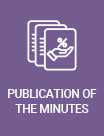Minutes for Banco de la República's Board of Directors Meeting on March 31, 2022
On March 31, Banco de la República's board of directors (BDBR) voted 5-2 in favor of a 100-basis point increase to the benchmark interest rate, bringing it to 5.0%; two board members voted for a 150-basis point increase.
The decision took into account the following considerations:
- Headline inflation maintained its upward trajectory in the first two months of 2022. Consumer inflation rose in February by 8.01% in annual terms, compared to 5.62% in December 2021. Foods and regulated items continued to exert upward pressure on the price index, increasing annually in February by 23.3% and 8.91%, respectively. Inflation excluding food and regulated items rose in annual terms from 2.49% in December to 4.11% in February.
- The Russian invasion of Ukraine, amid ongoing disruptions to global supply chains and supply restrictions, may generate additional inflationary pressures on some commodities for which those countries play an important role in production and exports. These include oil, natural gas, coal, fertilizers, and various agricultural products.
- Short-term inflation expectations have continued to rise. The median response to Banco de la República's monthly survey of analyst expectations in March showed expected headline inflation of 6.42% in 2022 (compared to 4.48% in the January survey) and 3.83% in 2023 (3.50% in the January survey). The accumulated effects of shocks on the economy have also led to increased inflation expectations in some medium-term indicators. Inflation expectations derived from financial market information from January to March showed increases in BEI inflation (excluding liquidity and inflation risk premiums) at two years from 3.68% to 4.57% and at five years from 3.65% to 4.14%.
- The most recently available data suggests that economic activity has maintained its positive impulse from 2021, with the economic tracking indicator (ISE) suggesting annual growth in January of 7.8%. The Bank's monthly commercial and industrial survey showed manufacturing growth of 15.1% in annual terms in January, while real commercial retail sales grew by 20.9%. Meanwhile, the national unemployment rate fell from 15.5% in February 2021 to 12.9% in February 2022. In this context, the technical staff has revised its growth projection for 2022 upward from 4.3% to 4.7%. In the technical staff's projection models, this increase suggests that excess productive capacity will continue to close at a faster rate than previously expected, especially if potential output is affected by supply shocks and lagging investment.
Based on these considerations, all members of the BDBR were in agreement over the need to continue to adjust monetary policy by increasing the benchmark interest rate to keep inflation expectations at the target. These steps would also be expected to diffuse the effects of supply shocks and increased international prices on other components of the goods basket, as reflected in increases to indicators of core inflation. While the board members agreed that the policy rate increase will contribute to a gradual convergence of inflation to the target, they differed over the size of the increase that should be adopted at this time. Five board members were in favor of a 100-basis point increase, while two members voted for a 150-point increase.
The five board members supporting a 100-point rise suggested it would reflect a significant increase to the policy rate that replicated the increase approved in January. These board members considered it prudent to maintain the pace of the interest rate increase adopted by the BDBR in January, given current international uncertainty, the need for continued recovery in Colombian employment levels, and the importance of maintaining economic performance following the significant shocks of the pandemic. They also considered that this increase would be sufficient as part of a gradual process of controlling inflation expectations, which for 2023 and beyond reflect a decrease compared to current inflation levels. Expectations of reduced inflation rates suggest that monetary policy remains credible and that target inflation continues to anchor price formation.
The two board members voting for a 150-point increase emphasized Colombia's strong recent performance in economic activity and improvements in employment indicators. They expressed concern that the inflation environment may become more difficult due to potential price pressures from significant increases registered in the producer price index. They also highlighted that gas price subsidies, which have provided relief to consumers, are unlikely to be sustainable. They perceived a risk that current nominal contracts, which tend to be agreed at one-year terms, will incorporate higher inflation expectations and generate persistent upward pressures on production costs that could affect the productive capacity of the economy. Finally, they expressed concern over the faster-than-expected withdrawal of monetary stimulus in the U.S., coinciding with increased risk premiums in Colombia associated largely with political uncertainty.
All members of the BDBR emphasized that the 100-basis point increase on March 31 came as part of a gradual but steady process that will continue in the coming months to ensure a progressive return to inflation at the 3% annual target.














.png)

































